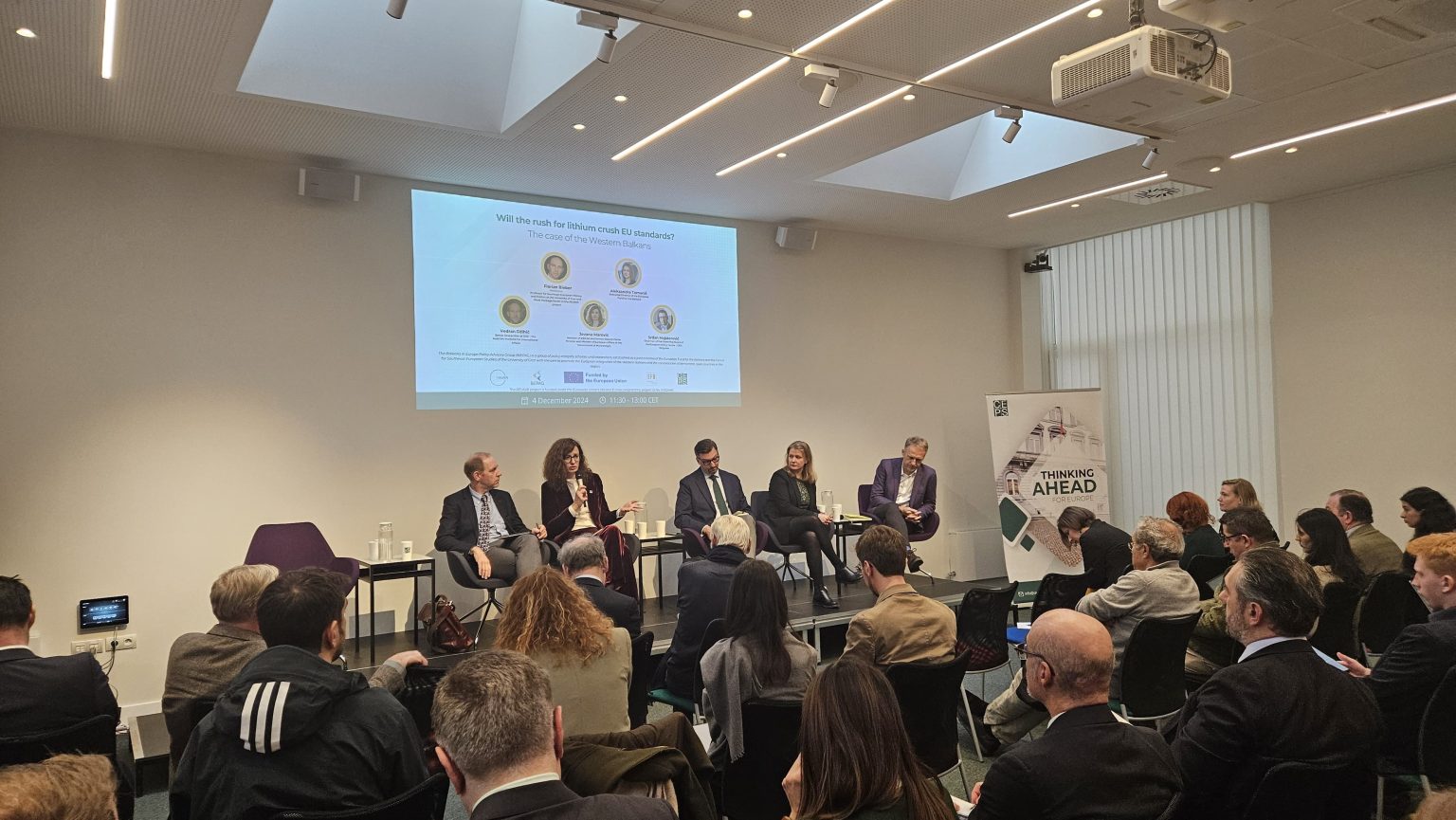
BRUSSELS – As a result of the increasing global demand for critical raw materials, including lithium, EU officials tend to turn a blind eye when it comes to the problems of the rule of law and the state of democracy in the Western Balkans. Such a tendency results in the fact that the European Union is losing credibility among the citizens in the region, concluded the participants of the discussion “Will the rush for lithium crush EU standards?”.
This event was jointly organised by the Balkans in Europe Policy Advisory Group (BiEPAG) and the Centre for European Policy Studies (CEPS) on 4 December in Brussels. Participants remarked that nobody from the EU institutions responsible for this issue accepted to attended, which was a worrying sign.
Florian Bieber, BiEPAG coordinator and professor for Southeast European History and Politics at the University of Graz, stated that the signing of the Memorandum of Understanding on critical raw materials between Serbia and the EU, which envisages a lithium-mining project, was “a very quick and obviously rushed decision”.
He added that such a move was preceded by the decision of the Constitutional Court of Serbia to declare the Government’s decision to stop the plan to build a disputed lithium mine unconstitutional.
“No public debate was held and it came almost out of blue, which raises questions about the legitimacy of the process… The fact is that some EU member states approve this project, which would have a great impact not only in Serbia but in the Western Balkans in general regarding the rule of law and democracy”, Florian Bieber said.
Similarly,Vedran Džihić, a member of BiEPAG and Senior Researcher at the Austrian Institute for International Affairs, claimed that one of the gravest concerns of the people and the ecological activists in both Serbia and Bosnia and Herzegovina is whether these countries are ready to implement the lithium-mining projects according to the EU standards.
“The lithium-mining fits into the narrative of progress that Serbian President Aleksandar Vučić has been using for years, promising citizens to live in a golden age… On the one hand, there is this utopian promise that does not fit the reality on the ground at all. On the other hand, there are the reality checks presented by the activists, who doubt whether these projects will be implemented according to the EU standards… Given the bleak state of rule of law in Serbia and the widespread institutions’ capture, which are even partly collapsing, it is quite obvious that these institutions can’t guarantee anything”, Vedran Džihić argued.
According to Džihić, the EU’s already weakened credibility among the people in the Western Balkans will only further erode due to the EU’s support for lithium mining in Serbia and Bosnia.
Srđan Majstorović, a member of BiEPAG and chairman of the Governing Board of the European Policy Centre (CEP), agreed that there is a widespread lack of trust in Serbia, which sparked concerns for the impacts of the lithium-mining project by Rio Tinto company.
“The key issue in Serbia is the lack of trust, both in the institutions and politicians, which is the result of the fact that we have been living in the captured state over the past twelve years. The way the EU officials are behaving nowadays when it comes to this issue is not always the wisest one, since it undermines the credibility of the Union… The citizens of Serbia who protested against lithium mining are not against the EU standards, they just want to be treated equally as citizens of EU member states respecting their right to be included in dialogue on important choices”, Srđan Majstorović remarked.
Aleksandra Tomanić,Executive Director of the European Fund for the Balkans, stressed that “it is very hard to believe in the narrative that everything will be done according to EU standards”.
“The recent protests against lithium mining demonstrated that there is still a democratic potential that exists despite all circumstances. Serbia and the Western Balkans are one of the most polluted areas globally, so the people defend their right to clean and healthy environment and the EU is turning a blind eye to it”, Aleksandra Tomanić underlined.
According to Tomanić, “it is very questionable how far lithium will remain a technology in future.
“The planned mine is above huge reserves of drinking water, which for sure will be a big challenge in the future, as it is already visible today in many EU member states”, Tomanic underlined.
Jovana Marović, member of BiEPAG and former Deputy Prime Minister and Minister of European Affairs of the Government of Montenegro claimed that “the lithium issue is a problem for all of us, not only for Serbia”.
“The lithium issue and the mining in the Western Balkans have implications for the EU enlargement at least at three levels: the first is that the rule “fundamentals first” is not valid any longer, it has been changed with the “money first” motto; the second thing is – if you are tolerating what Serbia does at home it is completely fine also what Serbia is doing in the region; and the third thing is the fact that the EU is losing its credibility”, Jovana Marović remarked.
Watch the whole discussion at the following link.
Source European Western Balkans